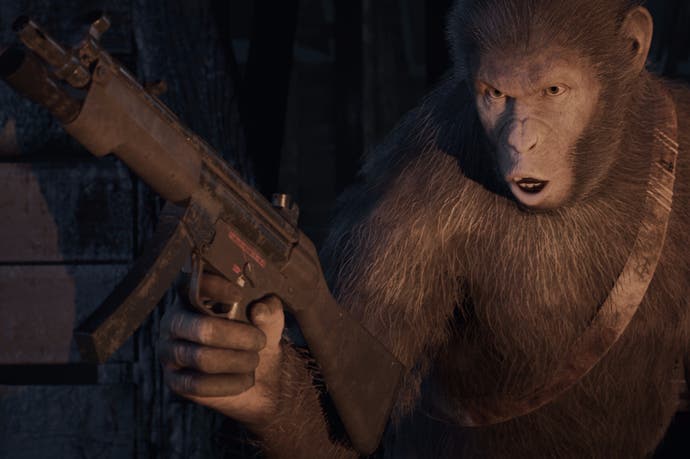Planet of the Apes: Last Frontier brings multiplayer to the narrative adventure genre
Caesar's palace.
I've got a real soft spot for the recent Planet of the Apes trilogy. A small part of it is how much fun it is to see some fairly serious science fiction in the cinema (though the less said about the climax of the series the better), and an even bigger part of it is just seeing Maurice's beautiful face. Maurice! You wonderful orangutan, you, with your screen-filling cheeks.
So I've been keeping a keen eye on Planet of the Apes: Last Frontier, the debut game from Ealing-based studio The Imaginarium that's set in the same universe. This narrative adventure finally broke cover this August (missing the cinematic release of the last film of the trilogy, somewhat unfortunately), and it's as bold as this genre gets - doing away with direct control, it's a 2-3 hour adventure where your input is boiled down to making quick fire decisions that fuel either the dialogue or the action.

A game that can be completed in an evening that only requires the use of two buttons? That's sure to get a few people's backs up, but I like how it so brazenly strips everything back to the bare essentials. From the demo I saw a while back, The Imaginarium has nailed the human drama and performance capture - perhaps no surprise, given the studio was set up by, among others, Andy Serkis and film producer Jonathan Cavendish - and by stripping back direct control you actually feel more directly involved in the narrative itself. It's deceptively smart stuff.
And now, in an extra crinkle, it's going to be adding multiplayer too.
Confused? I certainly was, so spoke to The Imaginarium co-founder Martin Alltimes to talk me through it all.

"It was designed to be multiplayer from the start," he tells me over Skype. "Everyone gets to vote. There are two types of choices - there are dialogue choices, and in those the majority wins. If three out of four people vote one way, that's the decision that's made, the branch that's activated. If there's a tie-break - at that point you've got an opportunity to convince your co-players to move to your side or vice versa. If your'e unable to make a decision, you get a token to spend to overrule everyone. It's a cinematic game, you want a certain amount of heated debate but you don't want there to be a blocker."
It sounds, against my preconceptions, like it could work, and like a lot of the rest of Planet of the Apes: Last Frontier, it cuts through a lot of nonsense to get to the essence of what makes for a good narrative adventure. I watch TV shows with my partner, and we go to the cinema together - and, when we get the chance to, we play games like this together too, so why not give us both a little input into it all?

"I don't want to just play these experiences on my own," says Alltimes. "On the couch multiplayer used to be a massive part of gaming, and it's really dwindled - you can't jostle with someone, you can't smile at someone, all those really intimate human things you can only do when there's someone in the room with you. It infuses a party game philosophy into a narrative game. You can't really say what the game is like to play - if you've got very cooperative people, the tone of the experience will be very different to when you're playing with people who've had a few drinks. It can be serious, co-operative or even very mischievous."
I'm looking forward to trying it all first-hand when it comes out this autumn, and I'm hoping The Imaginarium gets to apply its bold formula to other worlds at some point in the future. The early signs, at least, seem positive.
"My gut reaction was it was going to be like marmite, but it's been more positive than I thought," says Alltimes of the initial reaction to Last Frontier. "When we released the reveal trailer, that was positive - and what was surprising was when they got to see the gameplay, we couldn't disguise the fact there's no navigation, and the response has been positive. I'm trying to appeal to people like myself who believe in this genre, and that there are new ways to explore interactive storytelling beyond the traditional single player directly controlled experience. I'm heartened by the response so far."

